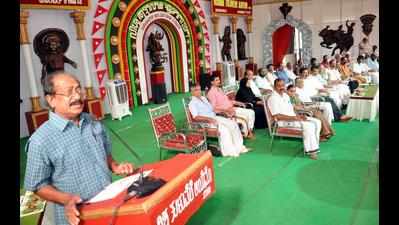- News
- City News
- kozhikode News
- Global meet to revitalize Tulu language
Trending
This story is from December 9, 2016
Global meet to revitalize Tulu language

(Representative image)
KANNUR: In an effort to revitalize a language that was earlier considered to be without script, the ‘Vishwa Tuluvere Ayano’, the World Tulu Fest, began at Badiyadka in Kasaragod on Friday, with a Bahubhasha Sammelanam, a meeting of multiple languages, which was inaugurated by eminent linguist and scholar Naduvattam Gopalakrishnan.
Inaugurating the meet, he said this kind of a global meet is a sincere effort to revive a language that was earlier considered to be dead.
“The revival such things is actually a cultural activity and it inspires people like us,” he said.
Tulu is not just a language but it is a culture that has a secular vision, and the World Tulu Fest aims to strengthen it, said Rajesh Alva Badiyadka, the general convenor of the programme. There are over 60 communities belonging to Tulu culture and even the Muslims and Christians are part of it, according to Alva.
Though the focus of the meet is Tulu language, it also aims to revive many other languages spoken among the Tulu culture, as part of which the Bahu Bhasha Sammelanam was organised.
As part of the meet, a Tulu-Malayalam dictionary, written by A M Sreedharan, eminent researcher and head of the department of Malayalam, Kannur University, will also be released on December 11, when the festival would be formally inaugurated by Veerendra Hegde, chief patron of Dharmasthala temple.
Till recently the belief was that Tulu does not have its own script but the researchers have found it has scripts and even literature written in the language, said Sreedharan.
“It was recently that the researchers traced the copies of Tulu Ramayana, Tulu Mahabharatha and other literary works in the language that has the script resembling Malayalam,” he said. He has already published a similar dictionary on Beary (Byari), another language from the Tulunadu region. If linguistic researches are done, it would shatter the popular belief that Malayalam originated from Tamil, said Sreedharan adding that Malayalam has its roots in Tulu.
Inaugurating the meet, he said this kind of a global meet is a sincere effort to revive a language that was earlier considered to be dead.
“The revival such things is actually a cultural activity and it inspires people like us,” he said.
Tulu is not just a language but it is a culture that has a secular vision, and the World Tulu Fest aims to strengthen it, said Rajesh Alva Badiyadka, the general convenor of the programme. There are over 60 communities belonging to Tulu culture and even the Muslims and Christians are part of it, according to Alva.
“However, the Tulu culture has been ignored by the authorities because it is spread across two states - in Kasaragod, Udupi and Mangaluru, thus getting no patronage from either of the states,” he said.
Though the focus of the meet is Tulu language, it also aims to revive many other languages spoken among the Tulu culture, as part of which the Bahu Bhasha Sammelanam was organised.
As part of the meet, a Tulu-Malayalam dictionary, written by A M Sreedharan, eminent researcher and head of the department of Malayalam, Kannur University, will also be released on December 11, when the festival would be formally inaugurated by Veerendra Hegde, chief patron of Dharmasthala temple.
Till recently the belief was that Tulu does not have its own script but the researchers have found it has scripts and even literature written in the language, said Sreedharan.
“It was recently that the researchers traced the copies of Tulu Ramayana, Tulu Mahabharatha and other literary works in the language that has the script resembling Malayalam,” he said. He has already published a similar dictionary on Beary (Byari), another language from the Tulunadu region. If linguistic researches are done, it would shatter the popular belief that Malayalam originated from Tamil, said Sreedharan adding that Malayalam has its roots in Tulu.
End of Article
FOLLOW US ON SOCIAL MEDIA










